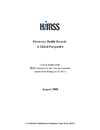
Healthcare information technology (IT) is a sleeping giant. Although healthcare budgets contribute to the bulk of worldwide industrialized government spending, healthcare IT lags far behind the technological capabilities of other global businesses including banking, telecommunications and the media.
The HIMSS Global Enterprise Task Force (GETF) was asked to investigate efforts to implement the electronic health record (EHR) in a host of countries around the world. GETF looked at a battery of electronic health record (EHR) components within each country, including security, quality, financing sources and barriers to adoption. Four common threads that affect EHR implementation and produce a kinship between every effort around the globe were identified:
- Funding
- Governance
- Standardization and interoperability
- Communication
Local and nationwide efforts to realize EHR systems were intermittently reported in all the countries we studied. When analyzing these efforts, the common threads listed above helped to explain the success, barriers or implementation failures experienced in each country.
Download Electronic Health Records: A Global Perspective White Paper (.pdf, 761 KB).
Download from the eHealthNews.EU Portal's mirror: Electronic Health Records: A Global Perspective White Paper (.pdf, 761 KB).
For further information, please visit:
http://www.himss.org
Global Enterprise Task Force
Chair, Steve Arnold, MD, MS, MBA, CPE
President & CEO
Healthcare Consultants International
Lagrangeville, New York
Co-Chair, Walter W. Wieners, FHIMSS
Managing Principal
Walter W. Wieners Consulting
Sausalito, California
Global Enterprise Task Force Members Contributors to the White Paper
Marion J. Ball, EdD, FHIMSS, FCHIME
Fellow, IBM Center for Healthcare Management
Professor Emeritus, Johns Hopkins School of Nursing
Baltimore, Maryland
Beverly L. Bell, RN, CPHIMS, FHIMSS
Partner
CSC
Westerville, Ohio
Dr. Ngai Tseung Cheung
Chief Medical Informatics Officer
Hong Kong Hospital Authority
Hong Kong
Georg Heidenreich
Manager, Healthcare IT
Siemens AG Healthcare
Erlangen, Germany
Susan J. Hyatt, BSc (PT), MBA
President & CEO
HYATTDIO INC
Oakville, Ontario, Canada
Gary M. Klein, MD, MPH, MBA, CHS-V
Chief Medical Officer, Vangent, Inc
&
President, American Academy of Disaster Medicine
Susheel Ladwa
Practice Leader, Healthcare and Life Sciences
Wipro Technologies
Minneapolis, Minnesota
Joanne Lessard, MScA, PMP, CPHIMS, CLSSBB
Senior Director
CIM - Conseil en Immobilisation & Management Inc.
Montréal, Québec, Canada
Yu-Chuan (Jack) Li, MD, PhD
President, Asia Pacific Assoc for Med Info
Professor and Chair, Institute of Biomedical Informatics, Taiwan
Cherie Montgomery
Product Management
Sorian Clinicals, Siemens Medical Solutions
Dave Nurse
Technical Director
CSW Group Ltd
Oxford, United Kingdom
Michael Nusbaum, BASc, MHSA, FHIMSS
M.H. Nusbaum & Associates Ltd.
Victoria, British Columbia, Canada
Erik Pupo, MBA
Senior Enterprise Architect
Pearson Blueprint Technologies
Vienna, Virginia
Sanjay P. Sood
Director
C-DAC School of Advanced Computing
Quatre Bornes, Mauritius
Joseph Wagner, MPA, FHIMSS
Principal
The Courtyard Group
New York, New York
Gerry Yantis
Vice President, Global Healthcare Lead
Capgemini Government Solutions
Herndon, Virginia
©2008 Healthcare Information and Management Systems Society (HIMSS).